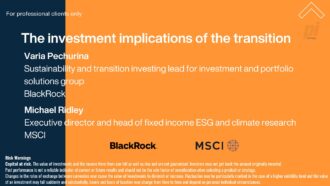Legal & General Investment Management’s Tim Dougall, head of investment advisory, and Lisa Purdy, head of fiduciary distribution, explain how their fiduciary management clients benefit from the insurer’s scale and wider expertise.
What conversations are you currently having with defined benefit (DB) pension schemes?
Lisa Purdy: A big one is the markets. There is a lot of uncertainty around, with Brexit and trade wars in particular concerning clients. That leads straight to a focus on how they can protect themselves from some of these risks, but also capture any opportunities. That often brings it back to a conversation about governance challenges.
Tim Dougall: Another topical area of discussion is buy-outs. The markets have been strong in recent years and that has helped a few schemes get closer to buy-out. I helped one of my clients reach their endgame this year.
In the markets more generally, there have been increasing discussions about illiquids. But we see schemes invested in illiquid assets unable to buy-out because they can’t transfer their assets. We find it puzzling that some of the potential pitfalls of illiquid assets don’t get more press.
Is ESG being raised more and more by your clients and potential clients?
Purdy: It is definitely a hot topic. With the DWP’s guideline changes and ESG required to be included in their Statement of Investment Principles, it is on clients’ agendas. It has been good for us because Legal & General has had a clear ESG policy for a long time.
When it comes to fiduciary management, ESG is implemented consistently across our client portfolios. We employ active voting policies in countries where we have significant public equity holdings. As a result, we vote 99% of the total value of our listed equity holdings. That engagement helps to make a difference for our clients.
Our clients can also take that a step further if they want to include funds that have ESG tilts, which could mean leaving out companies that solely produce coal or companies that manufacture controversial weapons.
What is your investment philosophy?
Dougall: Asset allocation, risk management and cost control are the key areas we focus on. LGIM having the capability and expertise to invest in all the asset classes that we need makes it easier for us to focus on asset allocation and risk management. It is also more cost effective.
Studies show that asset allocation is important, and most people say they focus on it, but many actually spend their time on manager selection. A Competition and Markets Authority (CMA) study last year showed that manager selection activity does not add a lot of value. So our focus is on asset allocation, risk management and cost control.
With reports that we are in the early stages of a global slowdown, how are you managing risk in your clients’ portfolios?
Dougall: It is probably one of the least attractive times in the last five to 10 years to be taking risk. But the risks are actually still balanced – investor sentiment is quite negative, and maybe the fundamentals are not supporting that as fully as they could. So we are neutral on risk overall.
Because of the increased uncertainty, sometimes we implement selective protection using options. That gives us exposure to the upside with some downside protection.
I have read that most schemes are investing passively when it comes to equities. Is this changing?
Dougall: On the equity side, LGIM is known as an index house and we are glad to see the world coming around to our way of thinking.
We have a focus on asset allocation and want to access asset classes in the most cost-efficient way. An index approach is a good way of doing that.
In the fiduciary management space, many consultancies try to outperform the benchmark and select lots of asset managers. That, for us, is not the area that adds value.
It is probably one of the least attractive times in the last five to 10 years to be taking risk.
Tim Dougall, LGIM
It is worth saying that being indexed and being passive are not necessarily the same thing. For example, we access through index, but we do not just hold a global market cap. We focus on which equity regions to invest in at a particular point in time and can implement through smart beta strategies as well.
What benefits do you bring to trustees?
Purdy: Having everything under one umbrella means that we can focus on asset allocation, risk management and cost control in a holistic way. As the UK’s largest pension fund asset manager, number one liability-driven investment (LDI) provider and having an experienced and well-respected team of asset allocation specialists, we are the only provider who brings those capabilities together for the benefit of our clients.
We have strong performance from our growth funds and a focus on cost control, which are two tangible examples of delivering value for our clients.
The other point is around buy-out. Our link with the wider Legal & General Group means we can help trustees on every step of their journey from where they are today, which might be relatively immature, right the way through to self-sufficiency or buy-out.
How are you easing the governance burden that pension schemes are increasingly carrying?
Purdy: We have a three-step process: advise, manage and monitor. Understanding the client’s needs, where they are trying to get to and how much risk can they afford to take is vital in setting a plan to reach their endgame.
The fiduciary manager’s job is then to build that portfolio and make sure it continues to work, by making it robust for different market environments and dynamic enough to be able to react to those conditions.
The final piece is monitoring. As a fiduciary manager you want to show clients all the details of the portfolio, but not all trustees are interested in reading a 50-page report.
We break that down into a two-page summary, containing the actions trustees need to take, whether they are meeting their objectives, any changes to the portfolio over the quarter and our views on market changes.
How do you provide value for money?
Purdy: With the CMA review, costs and transparency have come under a lot more scrutiny. We are pleased with that. It is something we have focused on for a long time.
It is not just the fees, but also the ongoing costs of a portfolio. There are a lot of hidden costs that are often overlooked, such as administration, legal and custody, all the things Legal & General has focused on minimising as much as possible.
Dougall: Because with us everything is under one roof, it is easier to trade without incurring costs.
We manage assets for more than 2,500 schemes, if one wants to sell an asset and the other wants to buy it then we cross those trades in the middle and everyone benefits. You only get that because of our scale.
Purdy: On the smaller client side, one of the points of fiduciary management is to enable them to access a wider range of opportunities but at a lower cost. We pass on the economies of scale of Legal & General, so our fiduciary management clients benefit just as our largest clients do.
Are defined contribution (DC) schemes taking an interest in fiduciary management?
Dougall: Fiduciary management in the DC space is a little different in terms of delegation. As well as our master trust we offer packaged funds, which are target date funds where you are embedding the investment philosophy in the fund and making it easier for people to access.
It is delegated management, a structured solution in a fund. We do not provide investment advice on the DC side at the moment.
What can we expect from LGIM’s fiduciary team in 2020?
Dougall: We want to serve UK DB pension schemes and because of LGIM’s large client base we have a pretty good insight into the issues schemes are facing. What we have noticed is that the larger pension schemes have been well served by the fiduciary management market, but smaller schemes have not been able to access it cost effectively, because of the cost of servicing those clients.
We are exploring ways to deliver something for the smaller schemes in a constructive way using technology to implement a solution that will help those schemes. More on that is coming next year.




